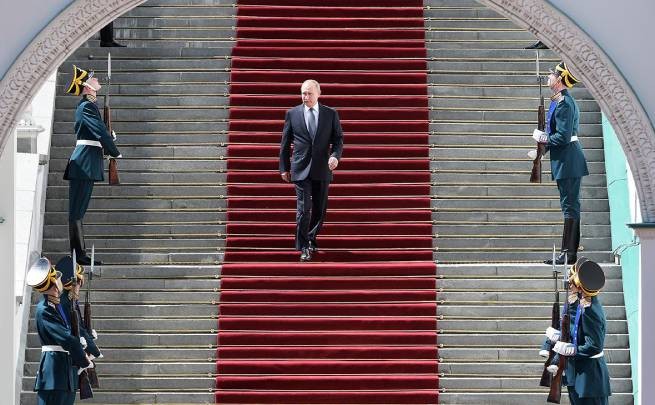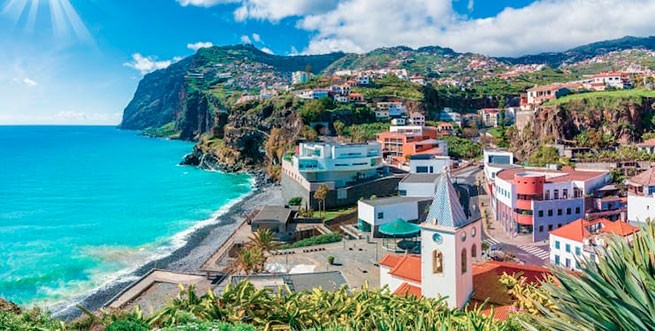After Portugal lured wealthy foreigners with investment incentives, the government is trying to stem a buying frenzy that has driven up house prices.
Housing prices in Lisbon rose 5.8% in November to a record 5,426 euros ($5,963) per square meter, according to Idealista. That’s the second-biggest increase in Europe behind Athens, the hottest real estate market among major European cities tracked by Bloomberg.
After growing by almost 30% over the past five years, residential property in the Portuguese capital is more expensive than in Milan, Madrid and Berlin. This puts a new home out of reach for most locals in Lisbon and shows how supply often trumps interest rates when pricing is set.
The Portuguese government has begun to change course, ending the golden visa program and approving a plan to cut tax breaks for new residents. But thanks to the sunny climate and prices around half those of Paris and Zurich, efforts to curb demand are having little impact.
“Despite these changes, we are seeing an increase in the number of requests from our foreign clients, says Paulo Silva, head of property consultant Savills in Portugal. “There simply aren’t enough homes to meet demand, even as sales slow.”
Although end of the era of cheap money has affected purchasing power across Europe, with the lack of supply affecting prices in many cities. In six of the 10 markets tracked by Bloomberg City Tracker, prices are rising.
Apartment in Loutraki 30m2 68,000 euros

In Athens, the annual increase in house prices is almost 12%, in Stockholm – more than 5%, and growth has been observed for six months in a row, and prices in Madrid and Milan are steadily growing by more than 3%. Paris performed the worst, falling by more than 6%.
To reflect the latest housing market trends in European cities, Bloomberg collects data from various providers. Some ask for interest rates and benchmark levels, while others provide official transaction data.
Lisbon has become a hotspot for investment since the end of its economic adventure in 2014. At that time, the government abolished rent controls and introduced the golden visa – the opportunity to obtain housing in exchange for a property investment of €500,000 – along with tax incentives to attract new residents.
Soon after, thousands of foreign buyers flocked to Lisbon in search of bargains as the country recovered from the economic crisis. Among them was Swiss billionaire Claude Berda, founder of French broadcaster AB Groupe. In 2016, he teamed up with local investor José Cardoso Botelho to buy his first plot of land on one of Lisbon’s seven hills.
“We were taking a selfie with the Tagus River behind us when we noticed a small sign that said ‘For Sale, says Cardoso Botelho. – We shook hands and that’s how it all started.”
The two founded Lisbon-based Vanguard Properties and have since built about a dozen residential buildings in the city of half a million people. The demand for them was so great that they were often sold out before they were even built.
Cardoso Botelho says the reason for the severe shortage of plots is the long wait for planning permission – eight years for one of his plots. Because of the red tape, Vanguard is unable to sell a single property next year, although it has delivered more than 500 apartments in the past two months – almost half of them to foreign buyers.
Rising property costs are forcing Portugal to abolish golden visas. In 2022, the supply of affordable housing in Portugal reached its lowest level in 15 years, according to Confidencial Imobiliario, which collects property market data. Social housing accounts for just 2% of the total – one of the lowest levels in EU.
Meanwhile, the average price of a new home in Lisbon has overtaken Dublin and Brussels, according to Deloitte’s Property Index 2022. For many Portuguese families, whose salaries are among the lowest in Western Europe, the dream of home ownership has been replaced by expensive, substandard rent in outlying suburbs .
The example of Lisbon shows how difficult it is for governments to regulate housing prices. While demand can be stimulated, maintaining supply takes time and money, and an imbalance can lead to boom-bust cycles.
There are growing fears that the current price rise could soon be reversed. Last month, Portugal’s central bank said banks must create additional capital reserves to cover possible housing-related losses. The move comes after home sales in Portugal fell 22% in the first six months of this year, according to real estate services firm Jones Lang LaSalle.
With housing unaffordable and rents soaring, more Portuguese are living in precarious conditions. There are about 40 tents set up in Quinta dos Ingleses, a small forested area on the outskirts of Lisbon.
“Every day there are new peoplesays Filipe Silva, who coordinates a program for the homeless at a community center in the parish of Carcavelos, near Lisbon. “These are mostly people who work but cannot pay for housing.”
The site is close to the elite Nova School of Business and Economics and an English school where tuition fees can exceed €1,000 per month. Growing inequality has fueled tensions, with thousands of people taking to the streets earlier this year to protest the housing crisis in Lisbon and other Portuguese cities, echoing discontent in other countries.
In response, Portugal’s socialist government promised to increase the number of affordable homes and eliminate benefits for foreigners. Outgoing Prime Minister Antonio Costa says the programs are fueling speculation in the property sector. But getting Portugal out of the market may not be so easy.
“Ultimately, the warm climate, stunning beaches, lifestyle and relatively low cost of living will continue to attract the interest of foreign investors.”says Pedro Coelho, managing director of real estate investment firm Square Asset Management.







More Stories
Real estate: investment interest in private islands in Greece
Eurostat: what goods and services do Greeks purchase online?
Optimistic forecasts for the Greek economy